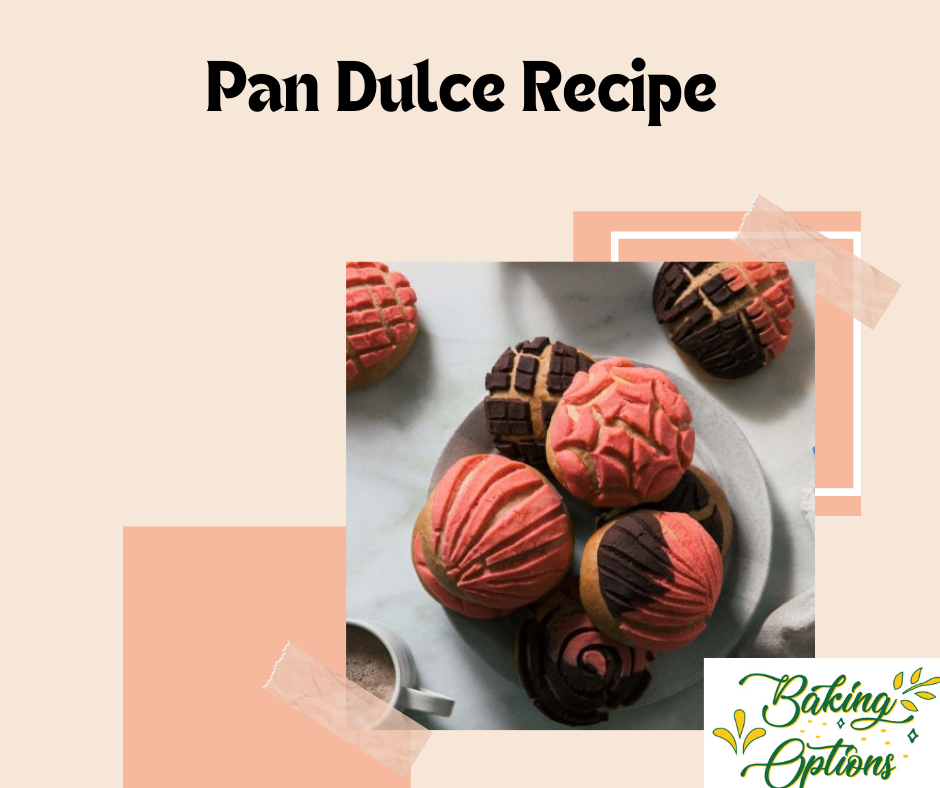I didn’t start cooking at home; I had a passion for cooking, so I initially took a course. There, I learned a lot about the foods of different countries and cultures.
When it comes to my favorite, it has to be the Mexican recipe, specifically the Pan dulce.
Later, I learned many more Mexican recipes, like the Ridiculously Easy Mexican Churro Cake, and I’ve learned a lot in cooking overall. But the recipe I will share now might be my all-time favorite Mexican recipe.
Contents
What is Pan Dulce
Pan dulce, as the name suggests, means sweet bread, and it is another type of Mexican bread consumed for breakfast, snacks, or dessert. These treats originated in Mexico due to the addition of wheat by Spanish colonizers as early as the 16th century.
They do not appear to be related, but overall, they have been greatly influenced by European baking traditions in the nineteenth century and became highly unique in terms of taste and form.
History of Pan Dulce
I remember that my guide told me the history of this recipe before preparing it. This recipe holds excellent value in Mexican culture. It is often enjoyed with coffee & is widely available in bakeries in Mexico. You can find it in the US in places where Mexican communities live.
People visit bakeries and choose their favorite color of bread. That’s about bakeries, but I will teach you how to make this recipe yourself so that you can customize it according to your preference.
Types of pan dulce
- Conchas
People commonly choose to enjoy delicate sweet bread known as conchas because they come with a shell-like crust. Several types of Mexican sweet bread exist which include vanilla and chocolate and strawberry but other flavors are available.
- Pan de Muerto
It is customarily prepared for Día de Muertos (Day of the Dead) and seasoned like pan de sal and has a rounded shape with an opening resembling a human skull or bones. It represents memory and is sometimes sweetened with orange peel.
- Orejas
These pastries have been rolled out in the form of a doughnut shape. That is the term’s literal meaning, and they are often sweetened with sugar and cinnamon.
- Polvorones
These small, crisp cookies, baked from flour, sugar, and nuts, are taken during festive seasons.
What You’ll Need for Pan dulce recipe
For the Dough
Let us get everything we need to make the mouthwatering recipe! You should prepare the following:
- Flour: 3 1⁄2 cups (this is the main base of our rolls)
- Yeast: 2 small packets (these help the dough rise & get fluffy)
- Salt: 1 teaspoon (just a tiny bit to increase flavor)
- Sugar: 1/2 cup (for sweetness)
- Powdered Milk: 1/2 cup (adds richness)
- Shortening: 2 tablespoons (helps make the rolls soft)
- Egg: 1 whole egg
- Water: 1 1⁄4 cups of tap water (warm is best)
For the Yummy Topping
To make it more special, you’ll also need:
- Butter: 1/2 cup (softened)
- Sugar: 1/2 cup
- Egg Yolk: 1 (just the yellow part)
- Cinnamon or Vanilla: 1 teaspoon (choose your favorite!)
- Flour: 2/3 cup (for the topping)
Let’s Make Pan Dulce Recipe
Prepare the Dough
First, in a bowl, add a cup of flour, yeast, salt, sugar, and powdered milk, and then add the eggs and warm water and whisk it a little with an electric beater. You need to beat it for 2 minutes. It might be a little messy at this point but don’t panic.
After 2 minutes, you should add another cup of flour to it. Then beat at full speed for another 2 minutes. It’ll create a smooth mixture, which we need for the bread.
Resting the Dough
Dust some flour on a clean surface, like the countertop or a cutting board, where you knead the dough. The dough will be super soft and almost stick to one’s hands; that’s okay. 🙂
You should then use the spatula to push it around the surface so that it picks a thin layer of flour on its surface. Lastly, cover it with the plastic wrap and allow it to rest by taking a 20-minute chilling time. While the dough rests, you can grease two baking sheets for future use and make the topping.
Making the Topping
This is the step I take now; I think that wherever you can save time in cooking, you should take advantage of it. Mix the butter and sugar to make a cream.
After that, add an egg and your favorite flavor. You can use cinnamon or vanilla. This mixture might feel a bit crumbly, but that’s completely normal.
Shaping and Final Touches
With the help of floured hands, cut the dough into 12 equal parts. Bend each piece round, then shape it into round buns. Put these on your greased baking sheets. Pour the topping mix over each bun and pat it into the dough.
Waiting Time
Place the rolls with the plastics back in the refrigerator for 4-12 hours of fermentation. It’s helpful to achieve excellent flavor! Before baking, transfer them to the fridge, unwrap them, and let them stand while preheating the oven to 400°F/200°C.
Baking
Bake the rolls at 450 F for approximately 15 minutes. Your whole kitchen will seem fragrant! The rolls should brown evenly and have a lustrous golden color on top.
How Can I Serve Pan Dulce Recipe in Traditional Style?
This recipe is very important in Mexican culture, so I suggest serving it in the Mexican style.
Best consumed with tasty beverages
For dessert, pan dulce is a sweet bread typically accompanied by hot beverages. The most popular pairings include:
Coffee—An evergreen pair: giving people what they love. From a leisurely breakfast on the weekend to a midday snack, coffee, and pan dulce make something as simple as that delightful.
Hot Chocolate—As the temperature drops, there’s no better comfort food than a bottle of hot chocolate well-matched with pan dulce. This combination is rather charming during the winter holiday and family dinners.
Milk—For a more direct approach, nothing goes better with sweet bread than cold milk because it brings a familiar kind of satisfaction.
Versatile Mealtime Companion
There is no specific time or location where pan dulce is usually consumed.
- Breakfast Traditions
It is a custom to have pan dulce in the mornings. Heaps of these sweet breads pass hand to hand, and families sit around the table and make memories while consuming them.
- Snacks and Sweet Moments
Pan dulce can be consumed as a snack throughout the day. They are suitable for something sweet in the middle of the day or a delicious treat after dinner.
What Makes Pan Dulce Different Than Others
Have you ever thought there are many types of bread, so why is this so important? Some reasons make this bread unique.
| Characteristics | Pan Dulce | Other Breads |
| Dough | Multiple types (brioche, puff pastry, shortcrust) | Typically, uniform yeast or cake dough |
| Fat | Often uses lard or margarine | Mostly uses butter |
| Flavor | Mexican ingredients (piloncillo, chocolate, native fruits) | Conventional flavors (cinnamon, nutmeg, vanilla) |
| Decoration | Colorful, intricate toppings | Minimal decoration |
| Culturally Significant | Deeply rooted in Mexican traditions | Less culturally specific |
| Variety | Hundreds of shapes and styles | Limited variations |
| Serving | Breakfast, social gatherings | More generic occasions |
How to Freeze Leftover Pan Dulce
If you want to keep your homemade pan dulce fresh, let it cool completely before putting it in a container or a plastic bag. This step helps keep it soft and prevents it from getting stiff.
You can leave it at room temperature to keep it fresh for a few days. But if you want to make it last longer, you can put it in the fridge or freeze it.
When freezing, first lay the cooled pan dulce flat on a baking sheet for about an hour to make sure it freezes nicely. Then, you can transfer it to a bag or container safe for the freezer.
Here’s how long you can store it.
- Room Temperature: 3 to 5 days
- Refrigeration: Up to 1 week
- Freezing: About three months a week
Best Recipe to Try
What makes the pan dulce recipe special is how it brings people together. Each bite holds a piece of culture, family history, & shared moments.
Whether it’s enjoyed in a peaceful moment alone or at a fun family gathering, pan dulce remains a cherished part of many food traditions.

